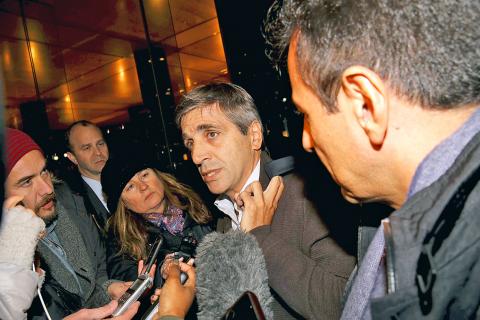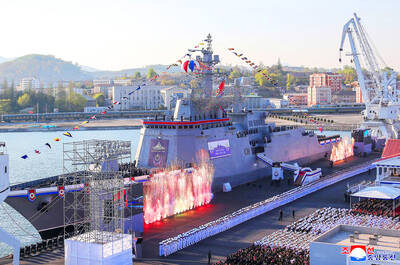Argentina on Friday offered a US$6.5 billion cash payment to creditors suing the country over defaulted bonds, seeking to end a festering 14-year legal battle that transformed it into a financial markets pariah.
Two out of six leading bondholders have already accepted the offer, US court-appointed mediator Daniel Pollack said, hailing the proposal by Argentina’s new, business-friendly government as an “historic breakthrough.”
The offer, if accepted by all litigating bondholders, would represent about a 25 percent discount or so-called “haircut” for creditors who filed claims of about US$9 billion.

Photo: Reuters
The turning point in the legal fight stemming from Argentina’s record default on about US$100 billion in 2002 comes less than two months after Argentine President Mauricio Macri took office and expressed his commitment to a deal.
If Macri manages to clinch an agreement, the cash-strapped country would be able to emerge from default and return to global capital markets to finance badly-needed infrastructure such as new roads and railways.
Lower borrowing costs would also be a boon for corporate and regional finances in Latin America’s third-largest economy.
The Argentine Ministry of Finance said the offer entailed “a payment of approximately US$6.5 billion if all the bondholders accept it.”
It followed five days of intense talks in New York led by Argentine Finance Secretary Luis Caputo. The former Deutsche Bank bond trader brought a market mindset to discussions after Argentina’s previous negotiator, former Argentine minister of the economy Axel Kicillof, an academic, frequently clashed with bondholders.
“The agreement was awesome,” Caputo told reporters after emerging from the mediator’s office in New York. “We have had a good reception of the proposals and I feel optimistic.”
Montreux Equity Partners and Dart Management were the two funds that accepted the proposal, according to the ministry.
The two lead creditors, Elliott Management and Aurelius Capital Management, both declined to comment on the offer.
“This is a big step in the right direction but this is not the end of it. Until the main holdouts accept a deal it is not over,” New York-based Greylock Capital Management investment officer co-chief Diego Ferro said.
The payment is to be financed through new sovereign debt issuances.
Buenos Aires-based investment bank Puente chief strategist Alejo Costa said a cash payment placed the financing risk in Argentina’s hands and offered the investors a premium.
Pollack praised Macri’s “courage and flexibility.”
Macri’s focus on reaching a deal with holdouts contrasts starkly with the hostile stance of former Argentine president Cristina Fernandez, who refused to settle with the creditors, whom she referred to as “vultures.”
Pollack said negotiations would continue with the four leading holdout investors that had not accepted the deal.
If a settlement is reached, Macri’s next challenge would be to push it through Argentina’s left-leaning Congress, where no party holds a lower-house majority.
The offer contained two separate proposals.
The first offers holders of defaulted debt who never joined the US lawsuit full payment on the principle value of their bonds plus 50 percent, mirroring a deal reached with 50,000 Italian creditors earlier this week.
The second applies to all creditors who have sued Argentina through the US law courts. It offers a 30 percent reduction on a creditor’s total claim. If the investor agrees within two weeks, the haircut would be trimmed to 27.5 percent.

Archeologists in Peru on Thursday said they found the 5,000-year-old remains of a noblewoman at the sacred city of Caral, revealing the important role played by women in the oldest center of civilization in the Americas. “What has been discovered corresponds to a woman who apparently had elevated status, an elite woman,” archeologist David Palomino said. The mummy was found in Aspero, a sacred site within the city of Caral that was a garbage dump for more than 30 years until becoming an archeological site in the 1990s. Palomino said the carefully preserved remains, dating to 3,000BC, contained skin, part of the

TRUMP EFFECT: The win capped one of the most dramatic turnarounds in Canadian political history after the Conservatives had led the Liberals by more than 20 points Canadian Prime Minister Mark Carney yesterday pledged to win US President Donald Trump’s trade war after winning Canada’s election and leading his Liberal Party to another term in power. Following a campaign dominated by Trump’s tariffs and annexation threats, Carney promised to chart “a new path forward” in a world “fundamentally changed” by a US that is newly hostile to free trade. “We are over the shock of the American betrayal, but we should never forget the lessons,” said Carney, who led the central banks of Canada and the UK before entering politics earlier this year. “We will win this trade war and

‘BODIES EVERYWHERE’: The incident occurred at a Filipino festival celebrating an anti-colonial leader, with the driver described as a ‘lone suspect’ known to police Canadian police arrested a man on Saturday after a car plowed into a street party in the western Canadian city of Vancouver, killing a number of people. Authorities said the incident happened shortly after 8pm in Vancouver’s Sunset on Fraser neighborhood as members of the Filipino community gathered to celebrate Lapu Lapu Day. The festival, which commemorates a Filipino anti-colonial leader from the 16th century, falls this year on the weekend before Canada’s election. A 30-year-old local man was arrested at the scene, Vancouver police wrote on X. The driver was a “lone suspect” known to police, a police spokesperson told journalists at the

North Korean leader Kim Jong-un has unveiled a new naval destroyer, claiming it as a significant advancement toward his goal of expanding the operational range and preemptive strike capabilities of his nuclear-armed military, state media said yesterday. North Korea’s state-run Korean Central News Agency (KCNA) said Kim attended the launching ceremony for the 5,000-tonne warship on Friday at the western port of Nampo. Kim framed the arms buildup as a response to perceived threats from the US and its allies in Asia, who have been expanding joint military exercises amid rising tensions over the North’s nuclear program. He added that the acquisition